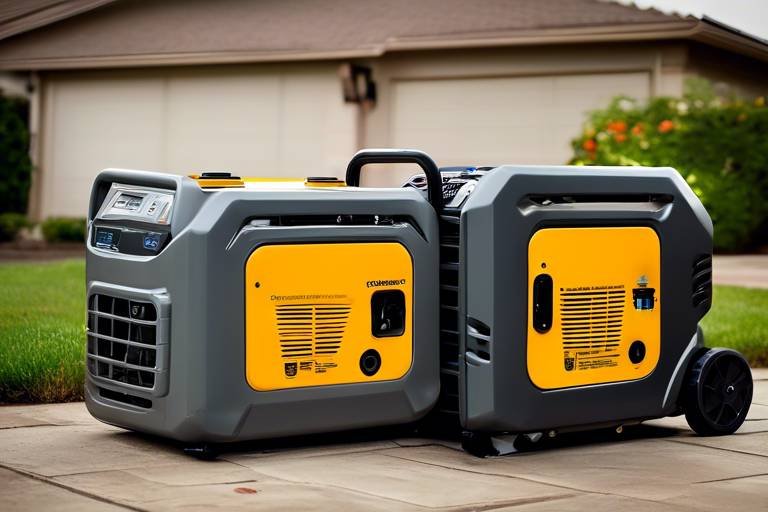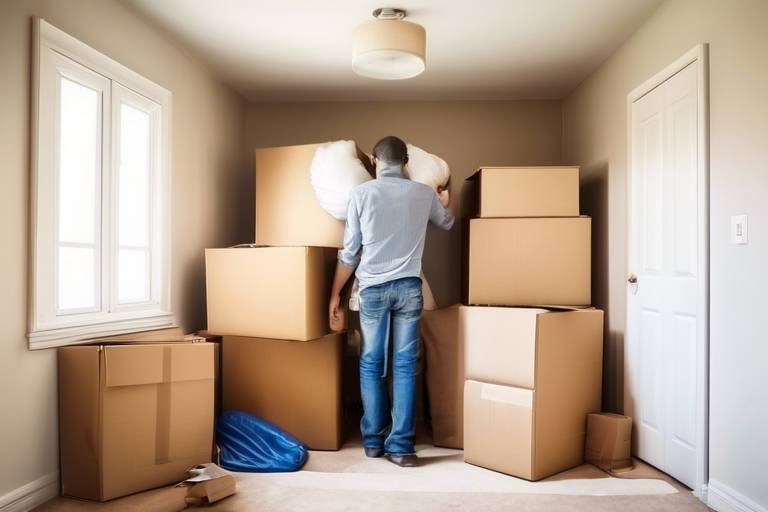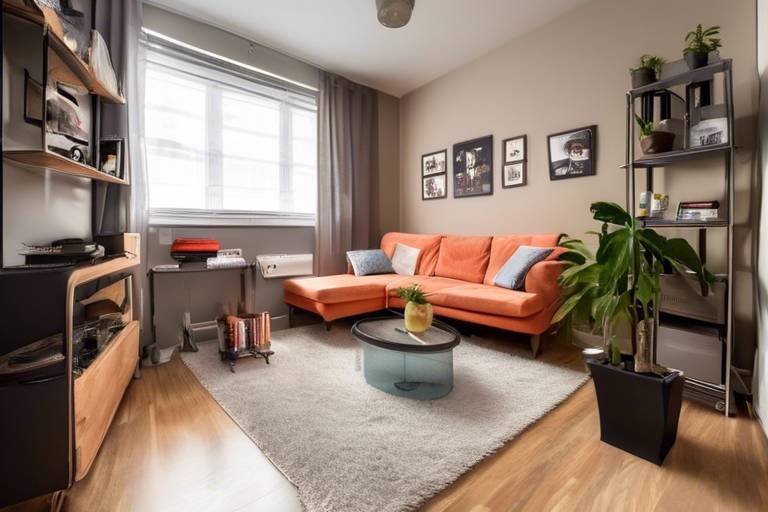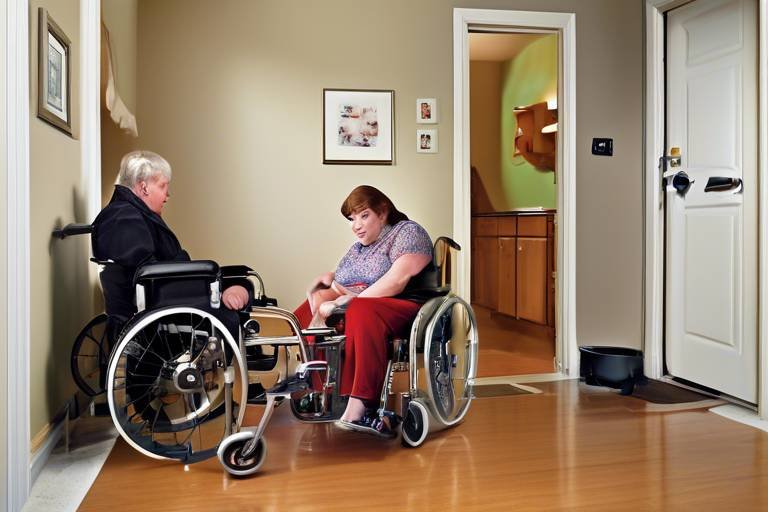Home Security and Privacy – Striking the Right Balance
In today's world, where crime rates can be unsettling and technology is evolving at breakneck speed, the need for robust home security has never been more critical. However, as we ramp up our security measures, we often find ourselves grappling with a pressing question: how do we maintain our personal privacy? Striking the right balance between these two aspects is not only essential for peace of mind but also for fostering a sense of safety within our homes.
Imagine your home as a fortress. You want it to be impenetrable to intruders, yet you also want to feel at ease within its walls, free to live your life without feeling constantly surveilled. This delicate equilibrium can be challenging to navigate, especially with the rise of smart home technology. These devices offer unparalleled convenience but can also become conduits for unwanted data collection and surveillance. So, how do we ensure that our homes are safe while keeping our personal lives private?
The first step in achieving this balance is understanding the importance of home security. A secure home not only protects your family and belongings but also provides a foundation for your overall well-being. When you feel secure, you can focus on enjoying your life and nurturing your relationships. However, security measures should not come at the expense of your privacy. It's essential to make informed decisions about the technologies and practices you implement, ensuring they enhance safety without infringing on your personal freedoms.
As we delve deeper into this topic, we must also address the growing privacy concerns associated with smart technologies. With devices that can monitor your home, control your lights, and even manage your thermostat, the convenience they offer can sometimes overshadow the potential risks to your privacy. For instance, many of these devices collect user data, which raises questions about how that information is used and who has access to it. Therefore, understanding these risks and how to navigate them is crucial in maintaining a secure yet private home environment.
In the sections that follow, we will explore various aspects of home security and privacy. From the benefits and drawbacks of smart home technology to the legal considerations surrounding surveillance and data protection, our goal is to equip you with the knowledge you need to make informed choices. By the end of this article, you will be better prepared to implement effective security systems that respect not only your privacy but also that of your family members.
- What are the best practices for maintaining home security? Regularly update your security systems, use strong passwords, and ensure all entry points are secure.
- How can I protect my privacy while using smart home devices? Limit the data you share with these devices, regularly check privacy settings, and keep your software updated.
- What legal considerations should I be aware of regarding home surveillance? Familiarize yourself with local laws regarding video and audio surveillance to ensure compliance.

The Importance of Home Security
Home security is more than just a trend; it's a necessity in today's world. With rising crime rates and increasing reports of burglaries, ensuring the safety of your family and possessions has never been more critical. But why is home security so important? Well, let’s break it down. Imagine coming home after a long day, only to find your front door ajar and your heart racing. The feeling of vulnerability can be overwhelming. This is why understanding the significance of home security is essential for every homeowner.
First and foremost, effective home security systems act as a deterrent to potential intruders. When they see visible security measures, such as cameras or alarm systems, they are less likely to target your home. It's like putting up a 'Beware of Dog' sign when you don’t even have a dog; it sends a clear message that you take security seriously. Moreover, a secure home not only protects your physical belongings but also provides peace of mind. Knowing that your loved ones are safe allows you to relax and enjoy life without constantly worrying about potential threats.
Additionally, many home insurance companies offer discounts on premiums for homeowners who have security systems in place. This means that investing in home security can save you money in the long run. It’s a win-win situation: you enhance your safety while also reducing your financial burden. Furthermore, home security systems can be integrated with smart home technologies, providing you with real-time updates and control over your home environment. Imagine being able to check on your property from your smartphone while on vacation—what a relief!
However, it’s essential to remember that home security is not just about installing cameras and alarms. It's about creating a comprehensive strategy that includes:
- Assessing vulnerabilities in your home
- Implementing physical barriers such as locks and fences
- Utilizing technology effectively to monitor your property
- Educating family members about safety protocols
In conclusion, the importance of home security cannot be overstated. It’s about protecting what matters most—your family and your belongings. By investing in the right security measures, you not only safeguard your home but also create an environment where you can thrive without fear. So, take the time to evaluate your current security situation and make the necessary improvements. Your peace of mind is worth it!

Understanding Privacy Concerns
In today's world, where technology seamlessly integrates into our daily lives, privacy concerns have become a hot topic, especially within the realm of home security. As homeowners, we often find ourselves caught in a web of wanting to protect our loved ones and belongings while also safeguarding our personal information. The rise of smart home devices, from security cameras to smart locks, has undoubtedly made our lives more convenient, but it also raises important questions about privacy. How much are we willing to give up in the name of security?
To grasp the full scope of privacy concerns, we need to consider the potential risks that come with these technologies. For instance, many smart devices are always listening or watching, which can lead to unintended surveillance. Imagine having a security camera that not only monitors your front porch but also captures every moment inside your home. This can create a sense of unease, as you might wonder who has access to that footage and how it's being used. The balance between security and privacy feels precarious, and one misstep could tip the scales.
Furthermore, the data collected by these devices can be a double-edged sword. While it can help enhance security measures, it also opens up a Pandora's box of privacy issues. Many homeowners are unaware of how much data is being collected, where it is stored, and who has access to it. For example, smart doorbells can track visitors, but that data can also be shared with third parties, raising serious concerns about personal privacy.
To navigate these murky waters, homeowners should be aware of the following privacy considerations:
- Device Permissions: Always check what permissions you are granting to your devices. Are you allowing them to access your contacts or location unnecessarily?
- Data Sharing: Understand the privacy policies of the devices you use. Are they sharing your data with advertisers or other third parties?
- Firmware Updates: Regularly update your devices to patch any security vulnerabilities that could expose your data.
In summary, understanding privacy concerns in the context of home security is crucial for every homeowner. It's about finding that sweet spot where you can protect your home without sacrificing your personal privacy. As we continue to embrace smart home technology, being informed and proactive about these issues is more important than ever.
Q1: What are the main privacy risks associated with smart home devices?
A1: The main risks include unauthorized data access, potential surveillance, and data sharing with third parties. Homeowners should be aware of how their devices collect and use data.
Q2: How can I protect my privacy while using smart home security systems?
A2: To protect your privacy, regularly check device permissions, stay updated on firmware, and read privacy policies carefully. Consider using devices from reputable manufacturers with strong privacy practices.
Q3: Are there legal protections for my privacy in home security?
A3: Yes, there are laws and regulations that govern surveillance and data protection. It's essential to familiarize yourself with these laws to ensure compliance while protecting your privacy.

Smart Home Technology
In today's fast-paced world, has become a buzzword that promises to enhance our lives with convenience and security. Imagine controlling your home’s lighting, heating, and security systems all from the palm of your hand! It’s like having a personal assistant who never sleeps. However, while these innovations offer incredible benefits, they also bring along a set of privacy challenges that cannot be ignored.
Let’s face it: integrating smart devices into your home can feel like stepping into a sci-fi movie. From smart doorbells that let you see who’s at your door to security cameras that can alert you of unusual activity, the options are endless. But here’s the catch—these devices often collect data about your daily routines, preferences, and even conversations. This raises a crucial question: how do we enjoy the perks of smart technology without compromising our personal privacy?
To navigate this delicate balance, it’s essential to understand both the advantages and drawbacks of smart home technology:
- Advantages:
- Enhanced Security: Smart cameras and alarms can provide real-time monitoring and alerts.
- Convenience: Automating tasks like locking doors or adjusting thermostats can save time and energy.
- Remote Access: Many devices allow you to monitor and control your home from anywhere, giving you peace of mind.
- Drawbacks:
- Data Privacy Risks: Devices may collect sensitive information, leading to potential misuse.
- Hacking Vulnerabilities: Poorly secured devices can be hacked, compromising your home security.
- Dependence on Internet: Smart devices require a stable internet connection, which can be a single point of failure.
To mitigate these privacy concerns, homeowners should take proactive steps. Regularly updating device firmware, using strong and unique passwords, and disabling unnecessary data collection features can significantly enhance your privacy without sacrificing security. Think of it as putting on a seatbelt; it’s a small step that can protect you from larger issues down the road.
Ultimately, the key to successfully integrating smart home technology lies in being informed and vigilant. As we embrace these modern conveniences, let’s also commit to safeguarding our personal information. After all, what good is a secure home if it comes at the cost of our privacy?

Data Collection Practices
In today's tech-savvy world, many smart home devices, such as security cameras, smart locks, and even smart speakers, are designed to enhance our safety and convenience. However, these devices often come with a trade-off: they collect a significant amount of personal data. This data can range from your daily routines to your location history, and while it can improve the functionality of these devices, it also raises serious concerns about privacy.
Understanding how these devices collect and use data is crucial for homeowners. For instance, many smart security cameras not only record video footage but also analyze it to detect motion or recognize faces. This means that they are constantly monitoring your home, which can feel invasive. The data collected is often sent to cloud servers for processing, which can expose it to potential breaches or unauthorized access.
To put it into perspective, consider the following common data collection practices:
- Video and Audio Recording: Many smart cameras and doorbells record audio and video, which can be stored indefinitely in the cloud.
- Location Tracking: Devices like smart locks and alarms may track your location to provide alerts when you're away from home.
- User Behavior Analysis: Some devices learn your habits over time to optimize their performance, which involves collecting data on your daily activities.
Homeowners must be proactive in understanding these practices. One way to ensure that you are not inadvertently giving away too much information is to read the privacy policies of the devices you use. These documents outline what data is collected, how it is used, and who it is shared with. However, these policies can often be dense and filled with legal jargon, making them difficult to comprehend.
Moreover, regular audits of your smart devices can help you stay informed about their data collection practices. Check the settings of each device to see what information is being collected and adjust privacy settings as needed. For instance, disabling features like facial recognition or limiting data sharing can significantly enhance your privacy without sacrificing security.
In summary, while smart home devices offer incredible benefits, they also come with inherent risks regarding data collection. By being aware of these practices and taking steps to manage them, homeowners can enjoy the convenience of smart technology while protecting their personal information.
- What types of data do smart home devices collect? Smart home devices may collect video, audio, location data, and user behavior information.
- How can I protect my privacy when using smart devices? Regularly review privacy settings, read privacy policies, and limit data sharing whenever possible.
- Are there legal protections for my data? Yes, various data protection regulations exist, but they can vary by region. It's essential to understand the laws that apply to your location.

Secure Device Management
In today's digital age, managing your smart devices securely is not just a luxury; it's a necessity. With the increasing integration of technology into our homes, the importance of cannot be overstated. Think of your smart home devices as a double-edged sword. On one side, they offer unparalleled convenience and efficiency, but on the other, they can expose you to privacy risks if not managed properly. So, how can you ensure that your smart devices enhance your home security without compromising your personal privacy?
First and foremost, regular updates are crucial. Just like your smartphone or computer, smart home devices need updates to fix vulnerabilities that hackers can exploit. Manufacturers often release firmware updates to patch security flaws—so make it a habit to check for these updates regularly. If your device allows for automatic updates, enable that feature to minimize your workload and maximize your security.
Next, consider password management. Many people underestimate the power of a strong password. Using default passwords is like leaving your front door wide open. Instead, create unique, complex passwords for each device and change them periodically. You can also use a password manager to keep track of your passwords securely. This way, you won't have to remember every single one, and you can ensure that each device has a strong password.
Another essential aspect of secure device management is network security. Ensure that your home Wi-Fi network is secured with a strong password and consider using a separate network for your smart devices. This practice limits access to your primary devices, such as computers and smartphones, thereby reducing the risk of unauthorized access. Additionally, regularly check the list of devices connected to your network and remove any that you do not recognize.
Finally, be mindful of the data your devices collect. Many smart devices collect data to function optimally, but this data can also be a treasure trove for hackers if not protected. Check the privacy settings on your devices and adjust them to limit data collection wherever possible. This proactive approach will help you maintain a higher level of privacy while still enjoying the benefits of smart home technology.
In summary, secure device management is about being proactive. By regularly updating your devices, managing passwords effectively, securing your network, and being cautious about data collection, you can enjoy the benefits of smart technology without sacrificing your privacy. It's all about finding that sweet spot where convenience meets security—because, at the end of the day, your peace of mind is worth it!
- What is secure device management?
Secure device management involves practices that ensure the safety and privacy of smart devices in your home, including regular updates, strong passwords, and network security.
- How often should I update my smart devices?
It's best to check for updates at least once a month or enable automatic updates if available to ensure your devices are protected against vulnerabilities.
- Can I use the same password for multiple devices?
No, using the same password for multiple devices increases your risk. Each device should have a unique, strong password to enhance security.
- How can I secure my home Wi-Fi network?
Use a strong password, enable WPA3 encryption, and consider setting up a guest network for your smart devices to keep them separate from your primary devices.
- What should I do if I find an unknown device on my network?
Immediately remove it from your network and change your Wi-Fi password to prevent unauthorized access.

Balancing Security and Privacy
Finding the right balance between security measures and personal privacy can feel like walking a tightrope. Homeowners are often caught in a dilemma: they want to protect their loved ones and valuables, but they also value their privacy. So, how can you achieve this equilibrium? The key lies in understanding your needs and making informed choices about the security systems you implement.
One effective strategy is to assess the specific security risks you face in your area. For instance, if you live in a neighborhood with a high crime rate, investing in a robust security system might be a priority. However, this doesn’t mean you need to sacrifice your privacy. Consider using discreet security measures such as motion sensor lights or doorbell cameras that are less intrusive than full surveillance systems. This way, you can deter potential intruders while maintaining a sense of personal space.
Another important aspect is to be selective about the technology you choose. Smart home devices can enhance security, but they can also lead to privacy breaches if not managed correctly. When integrating smart technology into your home security system, opt for devices that offer strong privacy features. For example, look for cameras that allow you to control who has access to the footage and provide options for local storage instead of cloud-based solutions. This helps ensure that your personal data remains secure and private.
Moreover, it’s essential to establish clear boundaries regarding surveillance. Inform family members about the security measures in place and discuss how they can coexist with personal privacy. Open communication can help everyone feel more comfortable and respected. Additionally, consider implementing privacy zones within your home, where surveillance devices are not permitted. This can create a safe haven for family members, allowing them to relax without the feeling of being constantly monitored.
Lastly, regular maintenance and updates of your security systems are crucial. Keeping your devices updated not only enhances their effectiveness but also minimizes vulnerabilities that could be exploited by malicious actors. Make it a habit to change passwords frequently and review your security settings. By taking these proactive measures, you can enjoy peace of mind knowing that your home is secure without compromising your privacy.
- What are some effective ways to enhance home security without invading privacy?
Using discreet security measures like motion sensor lights and doorbell cameras can enhance security while respecting privacy. Additionally, informing family members about security systems helps maintain comfort and trust.
- How can I protect my data when using smart home devices?
Opt for devices with strong privacy features, utilize local storage options, and regularly update your passwords and settings to safeguard your data.
- Are there legal implications for monitoring my property?
Yes, surveillance laws vary by region. It’s important to understand your local regulations regarding the use of cameras and monitoring to avoid infringing on privacy rights.

Legal Considerations
When it comes to home security, understanding the legal landscape is crucial for homeowners. After all, while safeguarding your property and loved ones is a top priority, it’s equally important to respect the privacy rights of others and comply with relevant laws. This balance can be tricky, especially with the advent of advanced surveillance technologies and smart home devices. Homeowners must navigate a maze of regulations that govern how they can monitor their property without infringing on the rights of neighbors or visitors.
One of the primary legal considerations for homeowners is surveillance laws. These laws vary significantly by region and dictate how you can use cameras and other surveillance tools. For instance, in many jurisdictions, it is legal to install security cameras on your property, but you must ensure that they do not capture footage of areas where individuals have a reasonable expectation of privacy, such as their backyards or inside their homes. Violating these laws can lead to legal repercussions, including fines or even criminal charges.
Another essential aspect is the data protection regulations that govern the collection and storage of personal information. With the rise of smart home technology, many devices collect data on user behavior, which can include sensitive information. Homeowners using these devices must be aware of their obligations under data protection laws, such as the General Data Protection Regulation (GDPR) in Europe or the California Consumer Privacy Act (CCPA) in the United States. These regulations often require homeowners to inform users about data collection practices and obtain consent, ensuring that personal information is handled responsibly.
To illustrate the various legal considerations, let’s take a look at a simple table that outlines some key points:
| Legal Aspect | Description |
|---|---|
| Surveillance Laws | Regulations governing the use of cameras and monitoring devices, including where they can be placed. |
| Data Protection Regulations | Laws that dictate how personal data must be collected, stored, and shared, requiring transparency and consent. |
| Liability Issues | Potential legal repercussions for failing to secure data or improperly using surveillance footage. |
In addition to these considerations, homeowners should also be aware of potential liability issues. If a security system is hacked or if surveillance footage is misused, the homeowner may be held liable for failing to protect the data or infringing on privacy rights. This underscores the importance of implementing robust security measures for both physical and digital assets.
To sum it up, navigating the legal considerations of home security and privacy is not just about compliance; it's about fostering trust with your neighbors and community. Homeowners should stay informed about local laws and regulations, ensuring that their security measures are both effective and respectful of privacy rights. This proactive approach not only protects you legally but also enhances the overall sense of safety and community well-being.
- What are the legal limits on surveillance cameras in residential areas? - Surveillance cameras can generally be installed on your property, but they should not capture footage of areas where individuals expect privacy.
- Do I need consent to collect data from smart home devices? - Yes, many data protection regulations require homeowners to inform users and obtain consent for data collection.
- What should I do if I suspect my security system has been compromised? - Immediately change passwords, update software, and consult with a cybersecurity expert to assess the situation.

Surveillance Laws
When it comes to home security, understanding is crucial for homeowners. These laws are designed to protect individuals' privacy rights while allowing homeowners to monitor their properties effectively. However, the balance between security and privacy can be a tricky one to navigate. For instance, what might be legal in one region could be considered an invasion of privacy in another. This discrepancy can lead to confusion and, in some cases, legal repercussions.
In general, surveillance laws dictate where and how homeowners can use cameras and other monitoring devices. For example, while it’s typically permissible to install cameras on your own property, the same may not apply to recording audio or placing cameras in areas where individuals have a reasonable expectation of privacy, such as inside their homes or in private backyards. This is where the legal nuances come into play, and it’s vital for homeowners to be aware of these regulations to avoid potential legal issues.
To give you a clearer picture, here’s a brief overview of key aspects of surveillance laws:
| Aspect | Details |
|---|---|
| Camera Placement | Generally allowed on private property, but not in private areas. |
| Audio Recording | Often requires consent from all parties involved, depending on state laws. |
| Notification | Some regions require signage indicating surveillance is in use. |
Moreover, it’s essential to consider the implications of video surveillance in shared spaces, such as apartment complexes or neighborhoods. Homeowners should be aware that while they may feel justified in monitoring common areas for security reasons, doing so without the consent of others may lead to disputes or legal challenges. Therefore, engaging with neighbors and discussing surveillance plans can foster a sense of community while safeguarding personal rights.
In conclusion, navigating surveillance laws is a vital component of establishing a secure home environment. By understanding what is permissible and what is not, homeowners can implement effective security measures without infringing on the privacy rights of others. Always remember: when in doubt, consult with a legal expert to ensure that your home security measures comply with local laws.
- What are the general rules for installing security cameras?
Generally, homeowners can install security cameras on their property, but they should avoid pointing them into private areas where individuals have a reasonable expectation of privacy. - Do I need consent to record audio?
Yes, in many jurisdictions, you must obtain consent from all parties involved before recording audio. - Are there any notification requirements for surveillance?
Some areas require homeowners to post signage indicating that surveillance is in use.

Data Protection Regulations
In today's digital age, where our homes are increasingly equipped with smart devices, understanding is crucial for homeowners. These regulations are designed to safeguard personal information and ensure that individuals have control over their data. As you integrate smart home technology into your security systems, it’s essential to be aware of the legal frameworks that govern how your data is collected, stored, and used.
One of the most significant pieces of legislation in this realm is the General Data Protection Regulation (GDPR), which applies to residents of the European Union. This regulation mandates that organizations must obtain explicit consent from individuals before collecting their personal data. This means that if you’re using smart security devices that collect data, the manufacturers must inform you about what data is being collected and how it will be used. Failure to comply with these regulations can result in hefty fines, making it imperative for homeowners to understand their rights.
In the United States, data protection laws can vary significantly by state. For instance, California's California Consumer Privacy Act (CCPA) grants residents specific rights regarding their personal information. Homeowners should be aware that they have the right to know what personal data is being collected about them, the right to delete that data, and the right to opt out of the sale of their personal information. This creates an environment where homeowners can take a proactive approach in managing their privacy.
When considering the use of smart home devices, it is essential to scrutinize the data collection practices of these devices. Many smart security systems collect a wealth of information, from camera footage to motion sensor data. Homeowners should ask themselves the following questions:
- What type of data is being collected?
- Who has access to this data?
- How long is the data stored?
- What measures are in place to protect this data from breaches?
To help homeowners navigate these regulations, it’s beneficial to have a clear understanding of the implications of using smart devices. For instance, many manufacturers provide privacy policies that outline their data handling practices. It’s wise to review these documents carefully to ensure that your privacy is not compromised.
Moreover, being compliant with data protection regulations not only protects your personal information but also enhances the trustworthiness of the security systems you use. As a homeowner, you should look for devices that prioritize user privacy and offer robust security features, such as end-to-end encryption and regular software updates.
In conclusion, as you invest in smart home technology for security purposes, staying informed about data protection regulations is essential. By understanding your rights and the obligations of device manufacturers, you can create a secure environment that respects your privacy. Remember, maintaining a balance between security and privacy is not just about technological solutions, but also about being an informed consumer who knows how to safeguard personal data in an increasingly connected world.
- What are data protection regulations? Data protection regulations are laws that govern how personal information is collected, stored, and used, ensuring individuals have control over their data.
- How does GDPR affect homeowners? GDPR requires that organizations obtain explicit consent before collecting personal data, which affects how smart home devices operate in the EU.
- What rights do I have under CCPA? Under CCPA, you have the right to know what data is collected, the right to delete your data, and the right to opt out of data sales.
- How can I protect my data when using smart devices? Review privacy policies, manage your settings, and choose devices that prioritize user privacy and data security.
Frequently Asked Questions
- What is the importance of home security?
Home security is crucial for safeguarding your family and possessions. It provides peace of mind, knowing that your home is protected against potential threats. By understanding the significance of home security, homeowners can make informed decisions about the measures they implement to enhance safety.
- How can I balance security and privacy in my home?
Finding the right balance between security and privacy can be tricky. One effective strategy is to choose security systems that prioritize user privacy, such as devices that allow you to control data sharing. Regularly reviewing your security settings and being mindful of where cameras are placed can also help maintain this balance.
- What are the privacy concerns associated with smart home technology?
Smart home devices can offer incredible convenience, but they often collect data that may infringe on personal privacy. This data collection can include everything from usage patterns to personal preferences. It's essential to be aware of these risks and take steps to secure your devices, such as changing default passwords and disabling unnecessary data sharing.
- What legal considerations should I be aware of regarding home surveillance?
Surveillance laws vary by location, impacting how and where you can use cameras and other monitoring tools. It's important to familiarize yourself with local regulations to avoid infringing on the privacy rights of neighbors or guests. Compliance with these laws ensures that you can monitor your property legally and ethically.
- How can I protect my data when using smart security devices?
To protect your data, regularly update your smart devices and use strong, unique passwords for each one. Be mindful of the permissions you grant to these devices, and consider using two-factor authentication whenever possible. Additionally, review the privacy policies of the devices to understand how your data is being used and stored.
- What are the implications of data protection regulations for homeowners?
Data protection regulations, such as GDPR or CCPA, impose strict guidelines on how personal information is handled. Homeowners using smart security devices must ensure compliance with these laws to avoid penalties. This includes being transparent about data collection practices and providing options for users to manage their information.


















